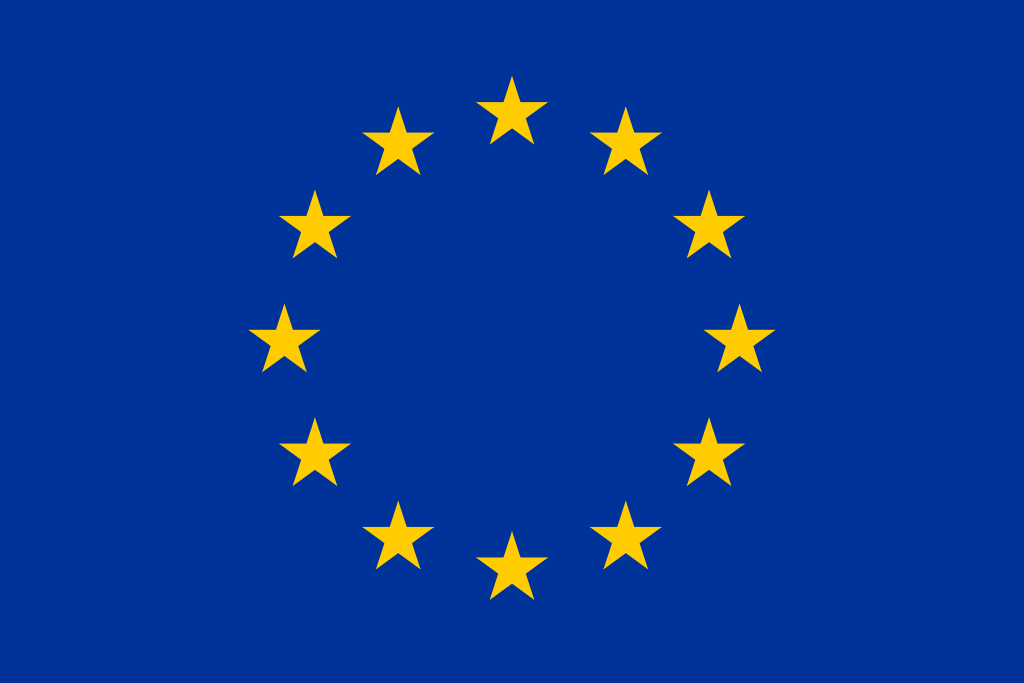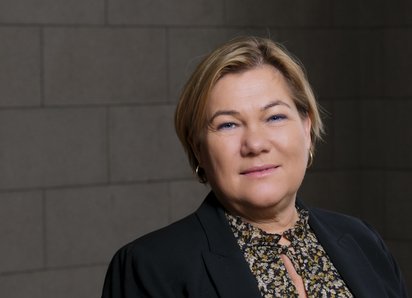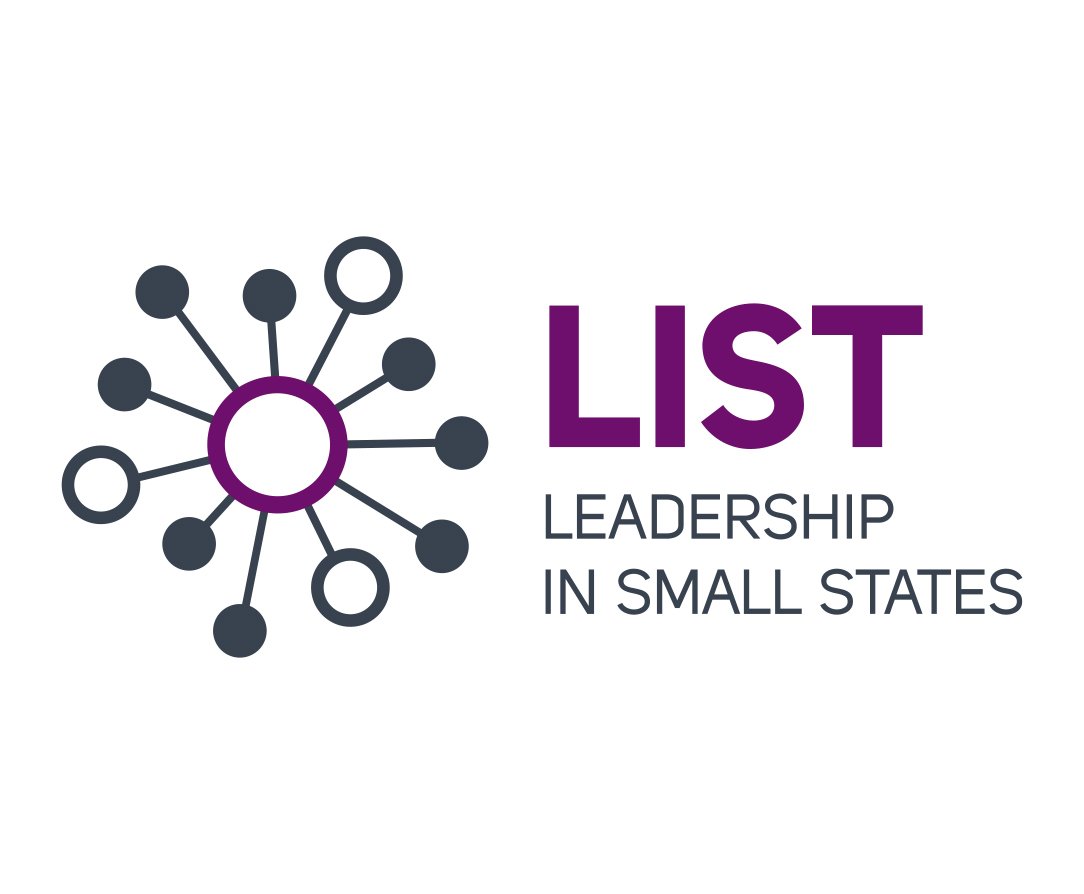
Leadership in Small States (LIST)
Rannsóknasetur um smáríkiLeadership in Small States (LIST) is an Erasmus+ co-funded Strategic Partnership between seven European universities that aims to train students and young academics, and equip them with the skills to take on a leadership role at home and abroad.
Leadership in Small States
Small states face structural disadvantages related to their size in the international community. Having a small population inherently inhibits the aggregate structural power of states and creates hurdles that need to be compensated for. A small state s administrative capacity is more limited than the capacity in bigger states, making it more challenging to engage in decisive and independent policy making. Good leadership skills are required to be able to practice the correct prioritisation and tactical bargaining in international diplomatic surroundings. Small states need to defend their interests in their key sectors and within these sectors they need to be able to show leadership initiative, offer clever solutions to problems, while also wielding positive influence outwards. Leadership skills are imperative to make this happen and secure successful diplomacy for a small state.
This consortium builds on a long-standing partnership between the participating institutions in developing small state studies as an academic discipline. The project is led by the Centre for Small State Studies at the University of Iceland in close collaboration with the University of Copenhagen, Tallinn University of Technology, Vilnius University, the University of Ljubljana, Århus University, and Lund University. The partnership has already run several projects together focusing on small state studies and achieved a cross-sectoral reach into for example political science, international relations, foreign and security policy and public administration. The central objective of this project is to use the vast pool of resources within the consortium to create a Massive Open Online Course (MOOC) focusing on the importance of leadership in small states.
The central objective of this project is to create a Massive Open Online Course, for the edX online courses platform. Edx is an online learning destination and MOOC provider, founded by Harvard University and MIT in 2012. It has more than 140 global partners with many of the world’s leading universities taking part in the project. It is an open-source platform so the course created by this partnership will be open access, freely available. In this project the consortium will finalise a manuscript for the 5 modules of the MOOC, that will serve as the basis for the final development of the course and the recordings for the edX platform.
In the project, the consortium hosted five leadership schools that each serve as the basis for a module in the MOOC delivered by this project.
These are:
- An Introduction to Small States and Leadership
- Small State Leadership in Public Administration and Governance
- Small State Leadership in Security and Defence Policy
- Small State Leadership in Gender Policy
- Small State Foreign Policy: Taking Leadership in International Diplomacy
The main target group for the MOOC are students that want to expand on their studies and current knowledge by adding a small state angle to their academic insight. In addition, the project does not only aim to reach out to students, but also the civil society and people that have finished their studies in any field and want to expand their knowledge - this can for example be academics, civil servants, politicians, former students, and the general public. Small state studies is a growing discipline within several academic disciplines (such as international relations and economics) and using the edX platform for the MOOC will maximize the outreach of the project and secure its continuing effect after the project's lifetime. EdX is not only a highly acclaimed platform for online courses but also open access, thus securing wide access for the final output of this project. This innovative platform will allow the partnership to create new teaching material that will be made available beyond the walls of the six participating institutions, offering other students, young professionals, activists, politicians and other interested individuals access to high-quality academic education.
Concept notes for the five modules in the forthcoming edX course
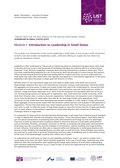
Module 1: Introduction to Leadership in Small States
This module is an introduction to the course Leadership in Small States. It aims to give a brief introduction to both small state studies and leadership studies, while also offering an insight into how these two academic standpoints interact
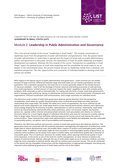
Module 2: Leadership in Public Administration and Governance
This is the second module of the course “Leadership in Small States”. The module concentrates on leadership issues from the perspective of public administration and governance.
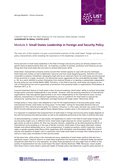
Module 3: Small States Leadership in Foreign and Security Policy
The main aim of this module is to give a concentrated overview of the small states’ foreign and security policy characteristics while revealing the importance of the leadership component in it.
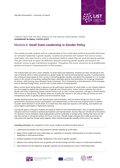
Module 4: Small State Leadership in Gender Policy
This module provides students with an understanding of how small states perform and profile themselves on normative leadership in gender equality. Students are presented with research from and on various small states, who have found a niche in international relations where they can excel and lead by example.
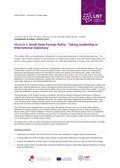
Module 5: Small State Foreign Policy - Taking Leadership in International Diplomacy
This module offers a comprehensive introduction to small state leadership in international diplomacy. The module will introduce students to the literatures on foreign policy analysis and small state foreign policy and build on these general insights when zooming in on small state leadership in foreign policy and diplomacy
